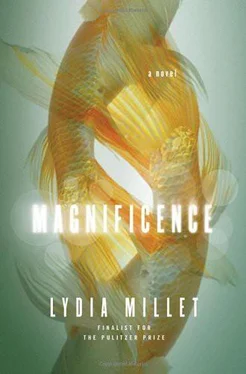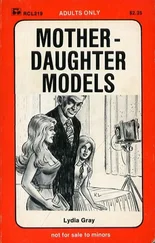Casey clung to T.’s hand and Susan stood beside her with her own hand on Casey’s other shoulder. She was pinching the shoulder, she realized slowly, quite hard though she did not intend to — out of anxiety, out of tension, pressing the hard ridge of the collarbone between her thumb and forefinger. She made herself relax her hold and the sensation melted into others, unnamed and nonspecific, hazy and suffocating as they stood there in a kind of dumbness. She felt buzzing around her from some unknown source. Was it electric? Was it imagined?
Casey did not seem to have felt the pinch. Her eyes were forward, fixed on the dark wood.
“Sorry if it’s not — there weren’t that many choices,” said T.
The scene was theatrical, three people presiding stiffly at a glass airport wall as coffins were lowered from the belly of the plane and rolled across the tarmac. More than one coffin, she thought, looked like an army of them.
“There are bodies on most commercial flights,” said T.
Often, when you flew, bodies flying beneath you, yet the proposition that on this flight one of them had been Hal’s — that Hal’s body had come in on this flight with T. — was absurd. The plane might have begun its descent just as Susan was leaning along the counter with her cleavage showing to ask the tattooed man for a couple of Marlboros — trying to picture, as she always did, whether he would be a strainer and heaver or a graceful thick beast. Whether his tongue would be stubby and awkward or pointed and cunning. Certainly, as a smoker, he would taste bad.
Hal’s body slim and tall, compared to the big man’s. And now also dead, compared to the big man’s.
It was almost her own body. Or it was hers without being her own, hers in the way that a home was, those spaces where you spent your time — as much hers as another body could be. By that token she too was almost dead. Wasn’t she? She had been with him forever, through all of it. Since the goddamn sixties. Three decades. He was hers and there were only two years between them; he had been fifty and she was forty-eight. She liked the smell and feel of his skin, she had always liked those things in him: his strangely delicate smell and the way he felt when she touched him. It was the skin that bound you most, the contact of two skins.
At that moment, because Casey had asked him, T. revealed quietly — trying to hedge at first but then, since there was clearly no way to dull the blow, said it outright— He was killed, killed with a knife in a mugging .
“Stabbed,” said Casey, inflectionless. “You’re saying my father was stabbed.”
When she forced him to it he went on, persevered with the dutiful exposure of facts: Hal had lain alone in a gutter and bled till he died. He had died where he fell. A crowded city and no one found him in time.
Susan asked when and then computed the hours: it had happened only half an hour after the last time they talked. Stabbed to death for a wallet that might have held nothing but forty dollars total, the rest in traveler’s checks. The cops had found it close by, in the trash.
Hal, hers. Thoughtful, sad, getting old. But not now. He would never be an old man.
The thought of him as he walked down the street, and then the sudden impact of the knife — maybe they threw him against the wall, maybe they knocked him down before they did it. . she almost cringed as she stood there, thinking of pain, but then again it was nothing like real pain or shock, she recognized, nothing like them at all. The mere idea of a cringe, the projection of it — an anticipation of impact. She tried to feel it and not feel it at once. Pain and suffering, they said, were not the same, but stabbed in the stomach — it happened in war movies: gut-shot, the soldiers shivered and said plaintively, “I can’t feel my legs, man.” She’d seen it more than once. The same scene must occur in dozens of movies. She strained toward an intuition of bleeding, of an opened-up stomach, but failed miserably because the insides of her arms were against her own ribs, feeling her own stomach: regular stomach, enclosed and protected. Regular arms, smooth and unbloody. She moved her hands across the skin.
Dictators, killers, they had no capacity for empathy or no interest in it. . but she, most people — you tried and you failed. Your efforts were inadequate. Pain was beyond simulation. Like sickness, it divided the population into haves and have-nots of pain. At the same time she wanted to be close to him and needed to be far away. Yet only one wish was granted.
He was utterly distant: here she was, and there was he. Gone.
The coffins disappeared beneath them, into the terminal basement, but neither she nor Casey moved. Down on the paved surface the blocky carts went on beelining in between planes — baggage carts and catering trucks pulled up for loading and unloading. Between all this bustling activity and the group of them — her, Casey, and T. — was only the filmy and gray-streaked glass. Between them were the membranes. She stood staring forward and not looking at all.
Once Hal had been beautiful. It was the fading that made him a subject of sorrow, how you could barely see the vestiges of his old beauty. He had never been vain, and because of his lack of vanity he failed to notice what he was losing. In that way a virtue became a liability — he was blind to his own looks vanishing. Only five minutes before she had said something cruel about him — what was it? already forgotten — and Casey had called her a bitch. Richly deserved, no doubt. Casey defended Hal, always. For Hal alone she had a tender love, and in rejecting pity on her own behalf she also rejected it for him. To her his fade was charming.
The moment was worse for Casey than for her, even. She knelt, holding the arm of the chair. She almost never did that, had learned to steady herself on other things when she knelt — to squat without touching the ground, without needing to. One of the first things she’d learned. Not to infringe.
“I’m sorry,” she whispered.
Casey’s eyes were red but her cheeks were dry, unlike Susan’s. She was in shock, Susan thought.
“Let’s get out of here,” said Casey.
“They’re taking him to Forest Lawn,” said T. “I’m sorry. It was the only one I could think of. At the time.”
“Anywhere,” said Casey, shaking her head.
Susan said nothing, following behind them. T. looked down at Casey often as they made their way to the elevators, put his hand on her shoulder more than once. Susan felt she was floating or being pulled: she barely saw anything but the carpet and the chair, the back of T.’s shirt and his pant legs. They had left Hal behind them; Hal was by himself. Lacking his faculties of perception, he could not know this, of course. He could not know he was alone. The saddest thing: he could not know he was alone.
Or was it not sad? Not sad at all?
He did not know where he was. He had become an object. She thought of him among the luggage — was it dark or fluorescent down where he lay? The rest of space lay against him.
A short time past she had only been thinking of T., but now T., standing beside Casey in the elevator, might as well be invisible. He was commonplace, by contrast with the killed. Stabbed and robbed, robbed and stabbed. Her husband had been killed.
She blinked rapidly, stood looking down in a daze at Casey as they moved into the elevator, passengers shuffling with their suitcases between their feet, crowding in. Casey hated it when elevators were full, her face forced into people’s asses and groins — usually said something loudly so that they’d give her a wide berth. But at the moment she was saying nothing. Her eyes were on the floor in front of her, her shoulders bent. Susan stood over her in a shroud of self-absorption: she was a pillar of salt, Lot’s wife.
Читать дальше












